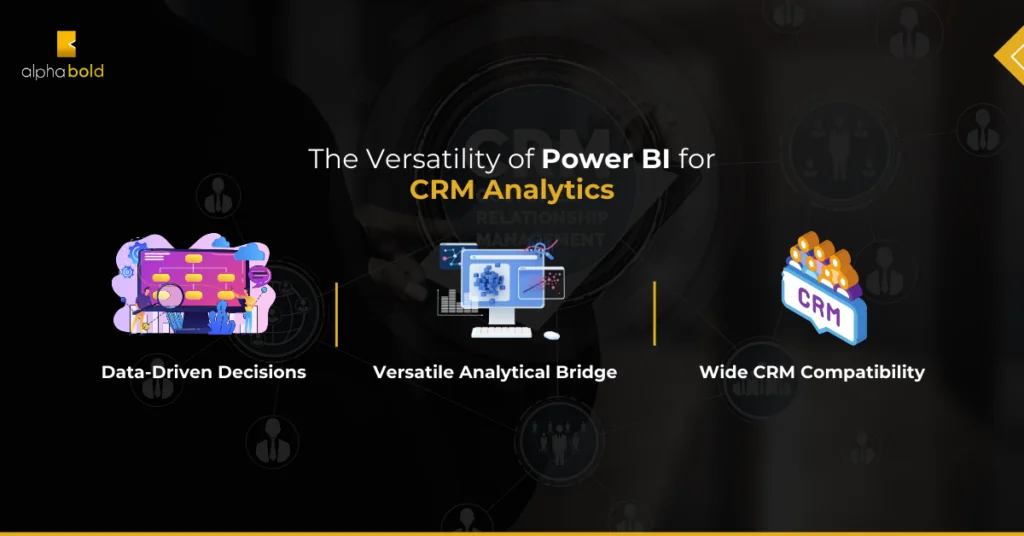Introduction
In this blog, we will explore how Power BI for CRM analytics is revolutionizing the integration of Dynamics 365 data, unlocking actionable insights, and empowering sales and marketing teams to drive success. By addressing data silos and leveraging robust analytical tools, Power BI enables data-driven decisions that enhance business performance.
Data has become the lifeblood of success in the ever-evolving sales and marketing landscape, and Dynamics 365 BI analytics stands at the forefront of this transformation. It’s not enough to merely collect customer information; businesses need to harness the power of analytics to gain valuable insights and make data-driven decisions. Customer Relationship Management (CRM) systems have played a pivotal role in managing customer data, but they often fall short when providing actionable insights. This limitation can be attributed to a variety of factors, including disparate systems, the complexity of managing omnichannel marketing data, and the need for more robust analytical tools to extract valuable insights from the wealth of information stored within these systems. This is where Microsoft Power BI steps in, offering a powerful solution for integrating CRM data and unleashing its full potential. Let’s explore the benefits of Power BI in interpreting CRM analytics- highlighting how a data analysis tool can help empower sales and drive marketing success.
The Role of Analytics in Sales and Marketing
Every sales and marketing team aims for one common goal: success. Success, in this context, is measured not only by revenue and conversions but also by the ability to adapt, optimize, and stay ahead of the competition. Achieving this requires a comprehensive understanding of your performance, and that’s where analytics comes into play. Analytics allow organizations to make informed decisions, refine strategies, and allocate resources effectively. Without analytics, businesses operate in the dark, relying on intuition rather than complex data. CRM systems may store vast amounts of information, but you need a robust analytics tool like Microsoft Power BI to transform this data into actionable insights. Creating actionable insights using CRM analytics is crucial for driving business success. Therefore, integrating Power BI CRM solutions can significantly enhance your analytical capabilities and overall performance.
Why Data Sits in Silos in Sales and Marketing and Its Impact on Analytics
Understanding the data landscape in sales and marketing requires a deep dive into data management architecture, corporate culture, and legacy systems. Dynamics 365 BI analytics plays a crucial role in this context. One of the most significant challenges faced by many businesses today is data silos. Why does this happen, especially in departments as crucial as sales and marketing? How does it affect analytics? Let’s break it down.
1. Origin of Data Silos in Sales and Marketing
- Distinct Departmental Goals and KPIs: Sales and marketing, while closely related, often operate with different objectives and performance indicators. Sales might be more transaction-focused, eyeing the closure of deals, while marketing might be looking at lead generation, brand awareness, or customer engagement. Because of these unique goals, each department might use different tools or databases tailored to their needs, leading to the creation of silos.
- Tool Fragmentation: The advent of specialized software and tools for various tasks has led to departments choosing platforms that cater specifically to their functions. For instance, while marketing may use automation tools, CRM systems, or email platforms, sales might lean towards contract management or lead tracking systems. Over time, this specialization can result in significant data fragmentation.
- Cultural and Communication Barriers: In some organizations, a culture of competition or lack of collaboration between sales and marketing can exacerbate the silo issue. When teams don’t communicate effectively, they are less likely to share data or integrate their systems.
2. Impact on Analytics
- Inconsistency in Data: Silos lead to a lack of standardization. Without a unified view, the same piece of data might be represented differently in sales and marketing databases. This inconsistency can skew analyses and lead to inaccurate conclusions.
- Missed Opportunities: Integrated data offers a comprehensive view of the customer journey, from initial brand awareness to making a purchase. With siloed data, it’s challenging to track this journey, leading to missed cross-sell, upsell, or nurturing opportunities.
- Redundant Efforts: Without knowing what the other department is doing, there’s potential for an overlap in efforts. For example, marketing might be targeting a segment of customers that sale is already engaged with, leading to redundancies and potential oversaturation.
- Delayed Decision Making: Extracting insights from siloed data takes time, as analysts often need to pull from multiple sources and then clean and standardize the data. This delay can slow down decision-making processes, making the company less agile and reactive to market changes.
- Increased Costs: Maintaining multiple systems, rectifying data inconsistencies, and missing opportunities all lead to increased costs. These can be direct (like subscription costs for multiple tools) or indirect (lost revenue opportunities).
Bringing It All Together:
The siloed nature of data in sales and marketing is a pressing issue for many businesses. Addressing this requires both technological solutions, such as integrated systems or unified data platforms like Dynamics 365 BI analytics. Additionally, cultural shifts towards more collaboration and open communication are essential. By breaking down these barriers and leveraging the capabilities of Dynamics 365 BI analytics, businesses can harness the power of unified analytics to drive growth and innovation. Creating actionable insights using CRM analytics is crucial for achieving these goals.
Unlock the Power of CRM Analytics
Enhance your sales and marketing strategies with actionable insights using Power BI for CRM analytics. See the difference it makes.
Request a Demo todayThe Limitations of CRM Systems:
Every technological investment in today’s business climate carries significant weight, especially with transformative tools like a CRM system. Key decision-makers focus on discerning a tangible Return on Investment (ROI). Therefore, a CRM solution must align with business priorities and deliver measurable value.
CRM systems excel in collecting and organizing customer data, like contact details and transaction history. However, they often fall short of providing meaningful insights. While CRMs can tell you “what” happened, they can’t always explain “why” or “how.” This leaves professionals needing more actionable intelligence to enhance relationships and drive growth.
Creating actionable insights using CRM analytics is crucial. Businesses often complement CRMs with tools like BI software and analytics platforms. By using Power BI for CRM analytics they can extract deeper insights, offering a comprehensive understanding of customer behavior and actionable recommendations.
Notable challenges when exclusively relying on CRM systems include:
- Data quality issues: Inaccurate or incomplete data can lead to misleading insights.
- Data integration challenges: Integrating data from multiple sources can create data silos and hinder analysis.
- Limited data analysis expertise: Effective reporting requires specialized skills that organizations may lack.
- Inadequate tools and resources: Insufficient investment in analytics tools can limit capabilities.
- Lack of clear objectives: Collecting irrelevant data without well-defined goals leads to wasted resources.
- Privacy and compliance concerns: Regulations may restrict the use of customer data for analytics.
- Scalability issues: Growing datasets and complex queries can challenge CRM systems.
- Vendor limitations: CRM software may offer limited features, requiring additional investments in third-party tools.
Integrating Power BI CRM solutions can significantly enhance your analytical capabilities and overall performance.
If you want a quick fix rather than reading this entire blog? Opt for our informative 2-minute video instead!
Microsoft Power BI: Unleashing the Power of Data:
Power BI, a dynamic and cost-effective Business Intelligence tool from Microsoft, plays a pivotal role in empowering organizations. It helps harness the full potential of their data with Dynamics 365 BI analytics. This powerful platform offers business analytics tools to extend reporting capabilities across various applications, including the widely used Microsoft CRM. These include Dynamics 365 Sales, Dynamics 365 Customer Service, and Dynamics 365 Marketing.
In the context of enhancing your CRM analytics capabilities with Dynamics 365 BI analytics, it’s essential to recognize the value that Microsoft Power BI brings to the table. Beyond its cost-effectiveness, Power BI seamlessly integrates with Dynamics 365 CRM applications. It allows you to transform CRM data into visually rich, insightful reports. This transformation extends your reporting capabilities significantly. It enables the generation of valuable predictions, forecasts, and performance metrics. With Power BI as your ally, your business can leverage a CRM analytics platform. This helps in making more informed and data-driven decisions within the Dynamics 365 environment, thus enhancing productivity and driving better results.
Microsoft’s modern CRM suite is Dynamics 365 Customer Engagement. It includes applications like Dynamics 365 Sales, Dynamics 365 Customer Service, Dynamics 365 Field Service, and Dynamics 365 Marketing. These applications are integrated and share a common database called Dataverse, which can be accessed by Power BI for data analysis.
Creating actionable insights using CRM analytics becomes easier with the integration of Power BI for CRM analytics. This integration significantly enhances analytical capabilities and overall performance.
Transform Your Data into Insights
Discover how integrating Power BI with your CRM can revolutionize your data analysis and decision-making process. Start your journey today.
Request a Demo todayA holistic View of Marketing and Sales Efforts:
Comprehensive performance overview: Power BI offers a holistic view of your marketing and sales efforts. It acts as a bird’s-eye view, allowing you to assess the big picture effortlessly. With Power BI, you can dive deep into your data, sorting it by various parameters, including marketing campaigns and lead sources. This empowers you to allocate your resources strategically for maximum impact.
Lead status tracking: Keeping track of your leads’ progress through the sales pipeline becomes seamless with Power BI. This enhances revenue forecasting accuracy and helps you optimize resource allocation, ensuring your team’s efforts are directed where they matter most.
Product/brand association: Understanding which products or brands are driving your revenue is crucial. Power BI sheds light on these associations, enabling you to fine-tune your marketing and product development strategies accordingly.
Empowering Sales Teams With A Robust CRM Analytics Platform:
The Power BI and CRM combination helps the sales and marketing teams predict and mitigate potential roadblocks before they even surface. It equips companies with the ability to foresee changes in the sales pipeline, allowing them to navigate around obstacles proactively. Furthermore, CRM analytics can quickly identify star performers alongside areas that need a bit of refinement. By doing so, Power BI helps management precisely pinpoint where support or coaching is needed, fostering a more productive and motivated sales force. Furthermore, CRM analytics solutions help identify opportunities stalled in a stage for longer than usual, signaling potential issues.
Easily understandable visuals:
- Visual representation: Power BI doesn’t just crunch numbers; it presents data in easily understandable visual formats. Complex data is transformed into intuitive charts and graphs, making it simpler for your team to grasp trends and patterns. This facilitates data-driven decision-making throughout your organization.
- Opportunity tracking: You can optimize your sales strategies effectively by monitoring the number of opportunities and their outcomes. This feature empowers you to set realistic revenue goals and adapt your tactics to achieve them.
- Estimated revenue: Gain insights into the potential revenue impact of your ongoing sales and marketing initiatives. This information is invaluable for financial planning and budgeting, ensuring you’re always on the right track.
- Conversion rate analysis: Identify bottlenecks in your sales process and address them effectively. This leads to improved lead-to-customer conversion rates, positively affecting your revenue stream.
- Year and quarter comparison: Comparing performance across different time periods is a breeze with Power BI. This allows you to set achievable growth targets and evaluate your progress over time, guiding your business in the right direction.
- Customization: Tailor the dashboard to your specific business needs and preferences. You can focus on the key performance indicators (KPIs) most relevant to your organization’s goals, ensuring your dashboard is a personalized tool for success.
Drive Business Growth with Power BI
Leverage the full potential of your customer data with Power BI for CRM analytics. Optimize your operations and drive sustainable growth.
Request a Demo todayBenefits of Micorsoft Power BI for CRM Analytics:
Let’s dive deeper into the specific benefits of leveraging Power BI for CRM analytics:
- Enhanced Decision-Making
Data-driven decision-making is at the core of successful sales and marketing strategies. Power BI enables you to make informed choices by providing real-time insights into your data.
- Improved Customer Segmentation
Power BI allows you to segment your customer base based on various criteria. This lets you personalize marketing efforts, increasing engagement and conversion rates.
- Optimized Sales Funnel
Understanding the sales funnel is crucial for driving revenue. Power BI enables you to track the entire customer journey, from lead acquisition to conversion, helping you identify bottlenecks and streamline the process.
- Resource Allocation
Efficiently allocate your marketing budget and resources by identifying which channels and campaigns yield the best results. Power BI helps you determine where to invest for maximum ROI.
- Competitor Analysis
Keep a close eye on your competitors by analyzing their market share, pricing strategies, and customer satisfaction levels. Power BI helps you stay competitive in a dynamic marketplace.
Microsoft Success story: Willis Towers Watson's Success with Microsoft Dynamics 365 and Power BI
Willis Towers Watson, a global insurance brokerage and advisory company, sought to enhance the strategic value of its dispersed client sales data. The company adopted Microsoft Dynamics 365 Sales for centralized engagement and Power BI for advanced analytics to achieve this goal. The rapid deployment of these tools resulted in an impressive 90 percent adoption rate within just six months.
This transformation provided Willis Towers Watson with increased data visibility, actionable insights, and the ability to personalize its services, ultimately leading to a substantial increase in sales leads. By leveraging Dynamics 365 Sales and Power BI, the company made data-driven decisions, gained a deeper understanding of clients, and streamlined its sales processes.
Read moreThe Versatility of Power BI for CRM Analytics:
One of the standout features of Microsoft Power BI is its compatibility with a wide range of CRM solutions. This includes a seamless integration with Dynamics 365 BI analytics. Whether your organization leverages Microsoft Dynamics 365, HubSpot, Salesforce, or another CRM system, Power BI ensures you can harness the power of data regardless of your platform.
These two technologies, particularly Dynamics 365 BI analytics when combined with Power BI, form a robust CRM analytics solution. This combination fosters data-driven decisions for sales and marketing teams. Power BI acts as a versatile bridge, connecting your chosen CRM solution with the world of data analytics. It effectively breaks down barriers, allowing you to gather, analyze, and visualize data from your CRM system. This transformation creates actionable insights using CRM analytics to fuel informed decision-making and drive your business forward.
By integrating Power BI for CRM analytics, businesses can significantly enhance their analytical capabilities and overall performance.

Conclusion:
The sales and marketing landscape has grown increasingly competitive. It is imperative to embrace CRM analytics, shifting it from a luxury to a necessity. Microsoft Power BI emerges as your reliable compass on the journey towards sales and marketing triumph fueled by data. Its manifold advantages encompass sharper decision-making, precise customer segmentation, streamlined sales processes, and tangible cost savings. Real-world success stories and data-driven insights underscore its pivotal role in contemporary business strategies.
At AlphaBOLD, we specialize in empowering companies of all sizes across various industries. We help them harness the potential of robust CRM analytics rooted in the foundation of Power BI. As a trusted Microsoft partner and CRM expert, we are dedicated to meeting our clients’ needs. We ensure they make the optimal choice for their business. We provide you with a CRM analytics platform that enables your organization to harness the full potential of your customer data. This platform helps streamline operations and drive sustainable growth.
Creating actionable insights using CRM analytics is crucial for staying competitive. Integrating Power BI for CRM analytics significantly enhances your analytical capabilities and overall business performance.
Experience the Future of CRM Analytics
Take your sales and marketing to the next level with advanced CRM analytics. Learn how Power BI can help you succeed.
Request a Demo todayExplore Recent Blog Posts








